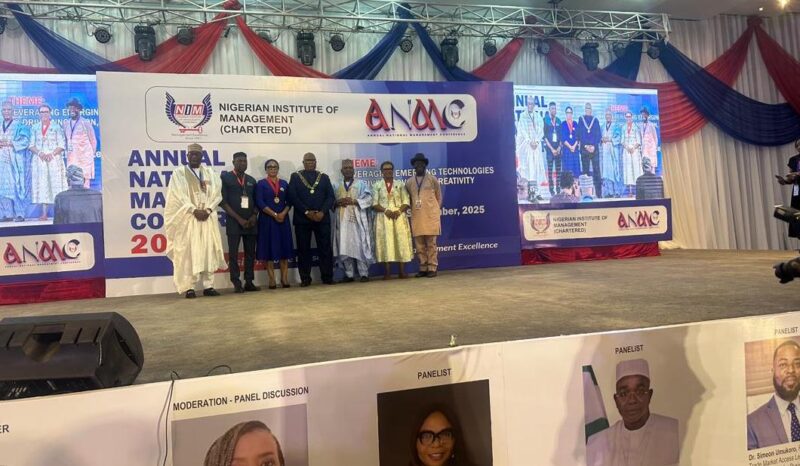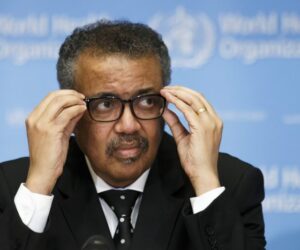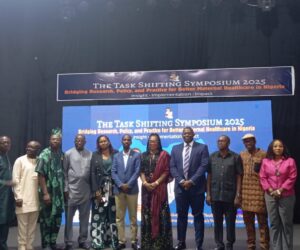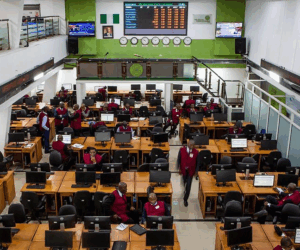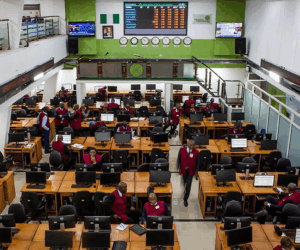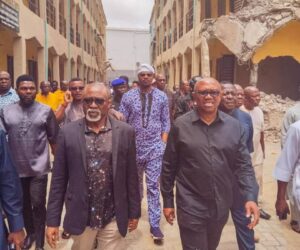The Nigerian Institute of Management (Chartered), NIM, on Monday declared open its 2025 Annual National Management Conference, with a call on government, business leaders, and professionals to leverage emerging technologies to drive national development.
The three-day gathering is themed “Leveraging Emerging Technologies to Drive Innovation, Creativity and Productivity.”
It has drawn government officials, business leaders, academics, and policy experts to interrogate how Nigeria can tap into artificial intelligence and other disruptive technologies to tackle economic and social challenges.
In his opening address, President and Chairman of the Council of NIM, Abimbola Ayuba, said the institute deliberately chose the theme to reflect the urgency for Nigeria to embrace artificial intelligence, robotics, biotechnology and other technologies in building a competitive economy.
“Technology is everything, and every forward-looking nation that wants to go the distance must leverage emerging technologies,” Mr Ayuba said.
He said the annual management conference, described as the institute’s flagship programme, is designed to provide practical recommendations to government and decision-makers on pressing national issues.
Mr Ayuba urged professionals and managers across sectors to embody values of discipline, transparency, accountability and efficiency in their work, warning that corruption and self-interest would continue to undermine Nigeria’s progress unless deliberately curbed.
In a goodwill message on behalf of the federal government, Michael Yenge, a representative of the Secretary to the Government of the Federation (SGF), said the conference theme was both timely and critical.
“In today’s rapidly evolving world, technology is no longer a distant enabler; it is the very foundation of national competitiveness and institutional relevance,” he said.
He stressed that Nigeria, with its youthful population and growing digital economy, has a unique opportunity to adopt new technologies to drive productivity in governance, agriculture, industry, education, health and services.
Mr Yenge highlighted President Bola Tinubu’s commitment to technology as a catalyst for national transformation, citing initiatives such as the Nigeria Startup Act, the creation of a Ministry of Communications, Innovation and Digital Economy, and targeted investments in broadband expansion, digital skills, and tech-enabled entrepreneurship.
“By prioritising policies that support artificial intelligence, digital finance, renewable energy technologies, and youth-focused innovation hubs, the administration is ensuring that Nigeria not only keeps pace with global technological trends but also leverages them to unlock creativity, drive industrial competitiveness, and create sustainable jobs,” he said.
He assured participants that the government remains committed to providing an enabling environment for innovation to thrive, through investment in infrastructure, capacity building, research and development, and private sector partnerships.

Nigerians excelling globally in tech
Earlier in his keynote address, the Country Director of Chemonics GHSE-PSM Project Nigeria, Mike Egboh, said Nigerians were already proving their capacity in global innovation hubs, particularly in robotics and advanced engineering.
“The best robotic engineers in the US today are Nigerians. Many of them are in Silicon Valley, in top innovation labs, contributing significantly to global technology,” Mr Egboh said.
He called for a national digital innovation framework, anchored on four pillars: sector-specific policies for AI and blockchain; investment in broadband, cloud infrastructure, and data centres; support for startups through funding and training; and expansion of internet access to rural communities.
He further stressed the need for inclusive policies to bring women, persons with disabilities, and underserved groups into the digital economy, alongside robust data governance, cybersecurity protections, and intellectual property rights.
“The cost of inaction is high. But if Nigeria embraces a technology-driven revolution, develops local capacity, and builds global competitiveness, we can transform our economy and society,” he warned.
The theme paper was presented by Mohammed Santuraki, pro-chancellor of the Federal University of Technology, Minna, who emphasised the importance of embedding technology into education and governance systems.

Panellists included former Speaker of the Ekiti State House of Assembly, Olubunmi Adelugba; NECO Registrar Dantani Wushishi; Simeon Umukoro of the UK Department for Business and Trade; and Nnamdi Nwaodu, an ageing expert and founder of the African Elder Ageing and Wellness Initiative.
Discussions also spotlighted youth leadership development, particularly in the context of migration-driven leadership gaps, and the challenge of ageing and post-retirement care for senior managers.
In his speech, Mr Ayuba noted that sustainable development could only take place in a peaceful and secure environment. He urged professionals to be “change agents” in their various fields by modelling integrity and efficiency.
“We must all resolve to bring discipline, effectiveness, probity, and transparency to our individual lives, the workplace, and our nation. Only when we give our best can we drive the aggregates of national development,” he said.
READ ALSO: NHIA pushes health technology reforms to cut waste, expand coverage
He added that Nigeria must “break from the past” and create a conducive operating environment if it hopes to harness technology for economic transformation.
Since its establishment in 1961, NIM has used its annual national conference as a platform for dialogue on critical development challenges.
Mr Ayuba commended the committee for “working tirelessly to put together a world-class event” and expressed optimism that the conference would produce actionable recommendations for government and the private sector.
With over 200,000 members nationwide, NIM describes itself as Nigeria’s oldest and largest management professional body. The institute has played advisory roles on economic policy, human resource management, and leadership development over the years.
As the 2025 conference continues with its sessions, organisers expect participants to draft strategies and recommendations on how Nigeria can leapfrog into the knowledge economy by applying emerging technologies across sectors such as agriculture, health, education, and public administration.

